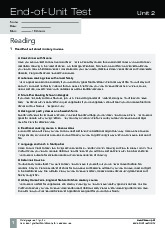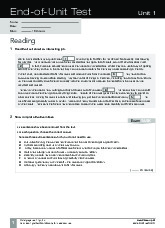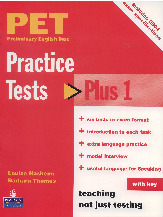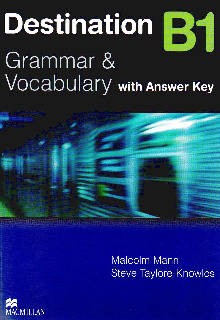






Preview text:
lOMoARcPSD| 39099223
READ THE FOLLOWING PASSAGES AND CHOOSE THE BEST ANSWER ON
THE ANSWER SHEET PROVIDED BELOW
Identify the choice that best completes the statement or answers the question.
It's hard to imagine, but the human body is about 73 percent water. (a) That makes getting enough daily water essential.
A person at rest loses about 40 ounces of water a day, but an active person can lose twice that
amount. Water leaves the body in obvious ways, but did you know that when you breathe,
water escapes in your breath? It even evaporates through your skin, especially in hot or dry
weather. When you work hard and exercise, sweating causes you to lose much more water.
The body needs water for its organs to function properly and to flush out toxins you ingest in
the food you eat and breathe in from polluted air. Because the body loses water all the time,
you must be sure to replace it. (b) You can drink at least 40 ounces of liquids each day, but
you can also intake water without drinking a drop from a glass. Many foods contain a large
amount of water, especially fruits and raw vegetables. At the same time, not all liquids are
alike. (c) Coffee, tea, and carbonated beverages such as soft drinks do not hydrate the body as
well as pure water and fruit juices.
What happens when the body does not get enough water? There are several signs of
dehydration, including low energy and dry eyes and mouth. (d) If you are fatigued, instead of
taking a nap, try drinking a glass of water. Often, it's all you need to feel refreshed. ____
1. The word DEHYDRATION in paragraph 3 is closest in meaning to a. health. b. too much water. c. lack of water. d. sickness. ____
2. The phrase AS WELL AS in paragraph 3 means a. in addition to. b. equally as good as. c. better than. d. different from. ____
3. According to the passage, an active person can lose a. 80 ounces of water a day. b. 20 ounces of water a day.
c. less water through breathing.
d. 80 ounces of water through resting. ____
4. According to the passage, what is NOT a good way to hydrate yourself? a. Eat fruits. b. Drink water. c. Drink orange juice. d. Drink tea. ____
5. Which of these inferences can be made from the information in the passage? a.
Drinking soft drinks is preferable to drinking water.
b. Some liquids are better than others at hydrating you. c. All foods can hydrate you.
d. Water is the only liquid that will hydrate you. ____ 6.
Which one of these is NOT mentioned in the
passage as an effect of not getting enough lOMoARcPSD| 39099223 water? a. Tiredness b. Lack of energy c. Dry mouth d. Bloodshot eyes ____ 7.
Why does the writer advise drinking water if you are sleepy? a. It's cheaper than going to the doctor. b.
You may be tired because you are dehydrated. c. Nothing else will work. d. Sleeping is not good for you. ____ 8.
From the context of the passage, the word NAP in paragraph 4 means a. medicine. b. soft drink. c.
a quick meal. d. a short amount of rest.
____ 9. What is the essential drink referred to in the title of the passage? a. Coffee b. Diet Coke c. Water d. Tea ____ 10.
Look at the four letters that indicate where
the following sentence could be added to the
passage. Which letter indicates the best place for the sentence?
Some drinks don't have the same effect as water. a. a b. b c. c d. d
Different types of fungi are often used in cooking--mushrooms are mixed into pasta and
soups, mold is used to make cheeses, and yeast is used in making bread and beer--but they
can also save lives. Some of the most valuable medicines in the world are derived from fungi,
including penicillin, which helps fight disease and infection in the body. Many medicines for
allergies are also made from fungi.
Doctors in the Far East have known for centuries that certain plants and fungi are beneficial in
the treatment of illnesses. (a) In the West, however, fungi have been seriously studied for
their healing effects only for the last 70 years. (b)
How did a common mold that was thought to be bad become an important medicine? (c) In
1928 in a hospital laboratory, Alexander Fleming was studying the flu virus, and by mistake,
penicillin was created. Fleming won the Nobel Prize for his breakthrough. It was one of the
greatest medical discoveries of the century. Penicillin and other medicines derived from
molds and fungi are now indispensable in the treatment of viruses and such diseases as cancer. (d)
Can people treat their own illnesses by eating pizza with mushrooms? Absolutely not! In fact,
some kinds of wild mushrooms are poisonous. Specific types of yeast and fungi must be
grown by scientists in a laboratory in order for them to work as medicines. So, buy your
mushrooms at a supermarket and enjoy them on your pizza, but let the doctors make medicine.
____ 11. The word DERIVED in paragraph 1 means a. related to. b. made from. c. connected to. d. caused by.
____ 12. What food is NOT mentioned in the passage as containing fungi? a. Cheese b. Beer c. Bread d. Butter lOMoARcPSD| 39099223
____ 13. What is NOT mentioned as something fungi is used to treat? a. Viruses b. Cancer c. Bacteria d. Allergies
____ 14. The word BENEFICIAL in paragraph 2 means a. helpful. b. dangerous. c. unknown. d. healing. ____ 15.
Chinese doctors have been using fungi as medicine a. for hundreds of years. b.
for the last 70 years. c. since 1928. d. since the 20th century.
____ 16. The word BREAKTHROUGH in paragraph 3 means a. broken object. b. work. c. discovery. d. research.
____ 17. The word INDESPENSIBLE in paragraph 3 means a. given out. b. valuable. c. forgotten. d. useless. ____ 18.
Which statement is NOT true? a.
Penicillin was created by accident. b.
Penicillin was created in a laboratory. c. Penicillin was created by Alexander Fleming. d.
Penicillin was created from mushrooms. ____ 19.
Why was the discovery of penicillin so important? a. It led to many deaths. b.
It led to medicines that treat many diseases. c. It won Fleming the Nobel Prize. d. It was an accident. ____ 20.
Look at the four letters that indicate where
the following sentence could be added to the
passage. Which letter indicates the best place for the sentence? It happened by accident. a. a b. b c. c d. d
Take this quiz and then read the rest of the passage.
Question 1. True or false? It's better to hide your mistakes than it is to laugh about them with others.
Question 2. In order to meet people in a new country, what should you do? Choose one or more answers.
(a) Search for places where other expatriates like to go out.
(b) Sign up for a class in something you enjoy doing.
(c) Walk around your new city often and talk to people.
There are no right or wrong answers! However, it's good to have a sense of humor about your
mistakes. Everybody makes mistakes, especially when relocating to a new country. (a)
What's the best way to meet people? All three answers are good answers, but the last two
options allow you to interact more with locals. No doubt you will feel homesick and want to
know some people who come from the same culture as you, but meeting local people will
expose you to different customs and new ideas, and will help you learn the local language. (b)
Signing up for a fun class in art, dance, cooking, or another topic is a great way to meet locals
with the same interests as you. lOMoARcPSD| 39099223
Remember, local people are curious about you, too. (c) If you ask questions and are interested
in learning about them, people will feel more comfortable about sharing their culture with
you. (d) Don't be afraid to try new things!
____ 21. The word EXPATRIATES in the second question means a. students.
b. people living in a foreign country.
c. people from your own country. d. local people.
____ 22. The word RELOCATING in paragraph 2 means a. learning. b. moving. c. adjusting. d. changing.
____ 23. To live in a foreign country, it helps to a. avoid mistakes.
b. be able to laugh at your mistakes. c. stay around expatriates. d. feel homesick.
____ 24. The word INTERACT in paragraph 3 is closest in meaning to a. socialize with. b. stay away from. c. meet. d. move to.
____ 25. The word CURIOUS in paragraph 4 is closest in meaning to a. nosy. b. interested in. c. confused. d. wondering. ____ 26.
Meeting new people will help you a. learn about local customs. b. dance. c.
miss home. d. remember your home. ____ 27.
What advice for living in a foreign country is NOT given in the passage? a. Have a sense of humor. b. Sign up for a class. c. Learn the history of the place you are moving to. d. Ask questions. ____ 28.
People will feel more comfortable with you if you a. stay with expatriates. b.
stay at home. c. ask questions. d. speak your native language. ____ 29.
How does the writer feel about making friends with expatriates? a. You
shouldn't. It won't help you. b. You should only make friends with people from your own country. c.
It helps you, but you should have local friends too. d. How silly of you to
go to another country and not make friends with the locals. ____ 30.
Look at the four letters that indicate where
the following sentence could be added to the
passage. Which letter indicates the best place for the sentence?
Being able to laugh at yourself puts people at ease, and they will usually respond in a friendly way. a. a b. b c. c d. d lOMoARcPSD| 39099223
Are you trying to follow a budget or save money? It's easier than you think! Here are some money-saving tips. 1.
Make coffee at home. If you buy a cup of coffee every day, it will cost you a lot of
money. Multiply the cost of a cup of coffee by 365 (the number of days in a year) to see how much! 2.
Pack your lunch. (a) Even if you aren't a good cook, you can make simple sandwiches and salads. 3.
Barter. Do you know someone who has a skill you need? Offer your skills in exchange
for someone else's, and all you spend is your time! 4.
Buy secondhand things instead of new ones. They're much cheaper, and they're one of a kind! 5.
Borrow books and videos from the library instead of buying or renting them from a store. (b) 6.
Buy in bulk. Buying things in large quantities is often cheaper than buying a little at a
time. (c) Find people who will share with you and split the cost. 7.
Be a volunteer at local theaters and concert halls. By volunteering, you are helping the
local arts, and you can see the shows for free. 8.
When you travel, try to stay in people's homes. It's cheaper, and you get to know the
local people and their customs much better. 9.
Give homemade gifts. For birthdays and holidays, don't buy gifts. Make them! If you
can cook, bake cakes or cookies. (d) If you are an artist, paint a picture. If you can sew, make a special pillow. ____ 31.
The word BARTER in No. 3 means a. sell a skill for money. b. exchange
one skill for another. c. buy a skill. d. learn a skill. ____ 32.
The word BULK in No. 6 means a.
a big object. b. a large quantity. c. cheap. d. heavy. ____ 33.
The word VOLUNTEER in No. 7 means a. a person who does a job for no pay b. a person who acts. c.
a person who sings. d. a person who likes the theater. ____ 34.
The phrase SPLIT THE COST in No. 6 means a. tear the bill. b. increase the bill. c. divide the goods. d. share the bill. ____ 35.
According to the passage, why should you make your own coffee? a. It
tastes better. b. It's easier. c.
It's cheaper. d. You can make it how you want.
____ 36. The word GIFT in No. 9 means a. cookie. b. present. c. art. d. shopping list.
____ 37. Something secondhand is a. used. b. broken. c. unwanted. d. forgotten. ____ 38.
What is NOT mentioned in the passage as a way to save money? a.
Borrow videos from a library. b. Buy things in bulk. c. Make your own clothes. d. Make presents for people. ____ 39.
What is NOT mentioned as a benefit of
staying in people's homes when you travel? a. It costs less. b. You make new friends.
c. You learn the country's customs. d. You get more help. lOMoARcPSD| 39099223 ____ 40.
Look at the four letters that indicate where
the following sentence could be added to the
passage. Which letter indicates the best place for the sentence? Eating out adds up. a. a b. b c. c d. d
Every year, more businesses are offering their goods to online shoppers. They post their
online catalogs on the Internet and wait for customers to arrive at the virtual checkout with
their credit card numbers ready. It's a fairly inexpensive way to do business, and the virtual
store is open 24 hours a day to anyone with access to the Internet. But is online shopping as
good for consumers as it is for businesses?
Online shopping offers consumers several advantages. (a) Buying from an online store is very
convenient for people with a home computer. Consumers don't need to take a bus downtown
or drive a car and pay for gasoline and parking. The Internet also offers a wide selection of
products. Customers can compare products and prices from several different businesses
before making a decision about what to buy. At some sites, they can even read reviews from
other shoppers to help them decide whether a product is good or a business is reliable. (b)
There are also several disadvantages associated with online shopping. Customers cannot
actually touch or try on a product before they buy it, so they may not be sure about the
product's quality. Shipping is also a concern since most products purchased online must be
sent to the customer. (c) Online shoppers also worry about privacy when they provide their
credit card numbers and other personal information over the Internet. (d) When shopping
online, using good judgment is extremely important. ____ 41.
The word ONLINE in paragraph 1 means a. walking on a line. b. on
the Internet. c. in a store. d. real life. ____ 42.
The word CATALOG in paragraph 1 means a. a list of products to sell. b. book. c. computer. d. pictures.
____ 43. From the passage, we can infer that people shop online with a. credit cards. b. cash. c. checks. d. coupons. ____ 44.
The word CONVENIENT in paragraph 2 means a. safe. b. slow. c. waste of time. d. easy.
____ 45. The word RELIABLE in paragraph 2 means a. real. b. trustworthy. c. broken. d. damaged. ____ 46.
What is NOT mentioned as an advantage of shopping online? a. You don't
need to find parking. b. You don't need to pay for gas. c. You can buy products from other countries. d.
You have a wide choice of products. lOMoARcPSD| 39099223 ____ 47.
What is NOT mentioned as an example of a disadvantage of shopping online? a.
You can't touch the product. b. It takes time to receive your products. c. Using credit
cards online may not be safe. d. Payment options are limited.
____ 48. The word PURCHASED in paragraph 3 means a. ordered. b. bought. c. sold. d. requested. ____ 49.
What is NOT mentioned in the passage about doing business online? a. It's not expensive. b.
Catalogs can be posted online. c. The process is automated. d. It's easy to do. ____ 50.
Look at the four letters that indicate where
the following sentence could be added to the
passage. Which letter indicates the best place for the sentence?
Some goods may arrive quickly while others take weeks to reach your doorstep. a. a b. b c. c d. d ANSWER SHEET 1.C 2.A 3.A 4.D 5.B 6.D 7.B 8.D 9.C 10.C 11.D 12.D 13.C 14.A 15.B 16.C 17.D 18.D 19.B 20.C 21.B 22.B 23.D 24.A 25.B 26.A 27.C 28.C 29.C 30.A 31.B 32.B 33.A 34.D 35.C 36.B 37.A 38.C 39.D 40.B 41.B 42.A 43.A 44.D 45.B 46.C 47.D 48.B 49.C 50.C




